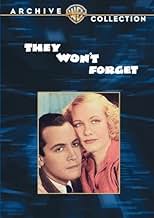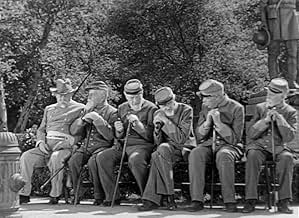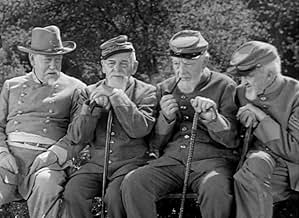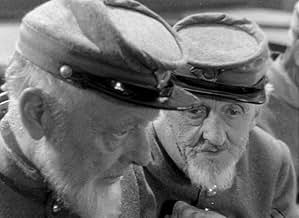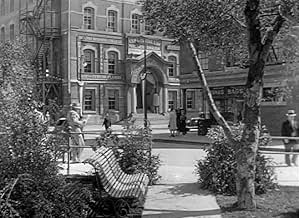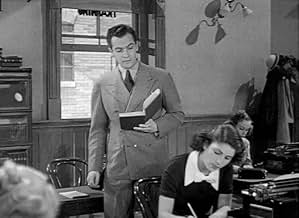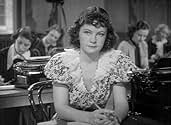Aggiungi una trama nella tua linguaA politically ambitious district attorney, unscrupulous tabloid journalists, and regional prejudice combine to charge a teacher with the murder of his student.A politically ambitious district attorney, unscrupulous tabloid journalists, and regional prejudice combine to charge a teacher with the murder of his student.A politically ambitious district attorney, unscrupulous tabloid journalists, and regional prejudice combine to charge a teacher with the murder of his student.
- Regia
- Sceneggiatura
- Star
- Premi
- 3 vittorie totali
- Mrs. Hale
- (as Elizabeth Risdon)
- Mrs. Clay
- (as Sybil Harris)
Recensioni in evidenza
It's Confederate Memorial Day, April 26, and the college lets out early, unexpectedly for instructor Edward Norris, a Northerner. But Turner returns for the vanity case she's left behind. Hours later, her body is discovered at the base of an elevator shaft. The town prosecutor (Claude Rains, slinging a Southern drawl) smells a political advantage that might propel him to the state senate, an advantage of no use if the perpetrator is only the illiterate black janitor who found her. Suspicion falls on Norris, and soon the judicial establishment, the press and the townspeople have turned against him. Outside help a detective and a defense attorney prove of no avail. Turner is convicted and sentenced to death; when the governor commutes his sentence, he's lynched (as was Leo Frank in the original case). It's fast, brutal and pretty unsentimental.
LeRoy was known for his slam-bang, take-no-prisoners style but here he dawdles at first. Under the credits is a medley of songs of the South, bolstered by quotations from Lincoln and Robert E. Lee to soften up those touchy audiences in Dixie so they won't know what hit them. When he gets up to speed, however, he doesn't slacken, cutting quick to advance the action his movie's an unstoppable steamroller, just like the judicial railroading of the story (the lynching itself, expressed by a mailbag clipped off its hook by a passing train, is especially and darkly adroit).
But there's a near-fatal flaw in the story. We're meant to harbor persuasive doubts as to Norris' guilt, but the possibility of a suspect other than he is never more than fleetingly entertained. The movie purports to document a miscarriage of justice, but it fails to build an ironclad case.
Great role for Claude Rains, who owns every scene he's in as a remorseless politician out to further his career regardless of cost. Edward Norris (Ann Sheridan's first husband) has probably his biggest role as Robert Hale and does a fine job. Film debut of Allyn Joslyn, who plays a slimy reporter colluding with Rains. Pretty Gloria Dickson plays Hale's wife. She has a potent speech at the end. First significant role for Lana Turner. Note the tight sweater which accentuates her...attributes. This is why she was dubbed "the sweater girl" early in her career. The rest of the cast is made up of familiar faces, including Otto Kruger and Elisha Cook, Jr.
Loosely based on the real story of Leo Frank, a Jewish man accused of murdering 13 year-old Mary Phagan in Georgia. He was lynched in 1915. The story here keeps antisemitism out of it, instead making it more of a focus on the resentments and prejudices of the South towards the North. Having grown up in the South, I know these sentiments were very real for many even decades after this movie was made. This is a film that examines everything from bigotry to mob mentality and the manipulation of the public by politicians and the media. Sociologically and historically relevant, it's a powerful movie from Warner Bros. with a good cast.
Lo sapevi?
- QuizThe novel "Death in the Deep South" and this movie version were based on the notorious murder trial and subsequent lynching of Leo Frank. The film mentions the suspect's Northern background, which was a factor in his lynching, but does not mention that he was Jewish. The real-life victim, Mary Phagan, was only 13 years old, a far cry from Lana Turner's 16-year-old "sweater girl."
- BlooperDuring the entire trial the shadow of the window is showing in the same place; behind the witness chair/over the back door of the courtroom.
- Citazioni
Drugstore Clerk: What'll it all be be, ladies?
Imogene Mayfield: Dope and cherry, Fred.
Drugstore Clerk: [to Mary] How about you, half-pint?
Mary Clay: Make mine a chocolate malt and drop an egg in it as fresh as you are.
Drugstore Clerk: The hens don't lay 'em that good.
- ConnessioniFeatured in Hollywood and the Stars: The Angry Screen (1964)
- Colonne sonoreKingdom Coming
(1862) (uncredited)
aka "The Year of Jubilo"
Music by Henry Clay Work
Played during the opening credits
I più visti
- How long is They Won't Forget?Powered by Alexa
Dettagli
- Tempo di esecuzione1 ora 35 minuti
- Colore
- Mix di suoni
- Proporzioni
- 1.37 : 1
Contribuisci a questa pagina



